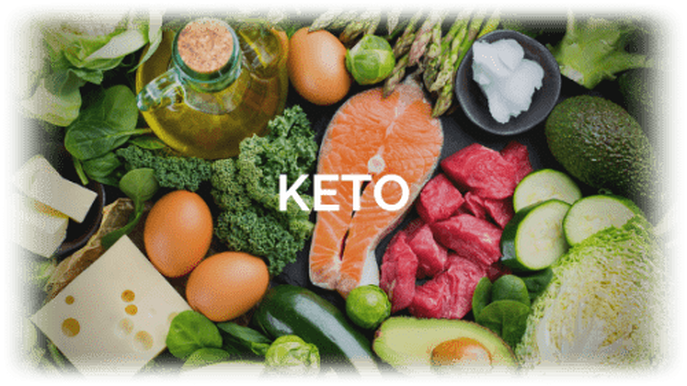What is the Ketogenic Diet?The Ketogenic ("Keto") diet has been around for a while, but has seen a spike in popularity over the last couple of years. The diet is centered around reducing carbohydrate intake to below 50g per day. To account for this decrease in carbohydrate intake, both the amount of protein & fat consumed is increased (particularly fat). The diet was actually first designed in the 1920's to help treat epilepsy, however it's more recently become popularised to help promote weight-loss. How Does it Work?Most standard diets that we see today are high in carbohydrates, which are the body's primary source of energy (carbs are broken down into glucose, providing cells with energy). The logic behind the Keto diet is that by restricting carbohydrate intake, your body is forced into using a different source of energy for fuel. That source is fat. By limiting carb intake, blood glucose levels inevitably fall. Resultantly, the production of an enzyme called hormone sensitive lipase (HSL) is triggered to increase. HSL causes stored triglycerides (fat) to be released from cells, broken down into fatty acids, and transported to the liver where finally they are converted into ketones - which can be used to fuel the body's cells. BenefitsIt Facilitates Weight-Loss It will help you lose weight - albeit initially water weight. This is because each gram of carbohydrate stored in the body holds on to approximately 2-3 grams of water. However, many studies have also shown that long-term adherence to a ketogenic diet leads to significant reductions in fat-loss. Reduced Appetite Studies have demonstrated that keto-diet participants experience less hunger and reduced appetite, even as the amount of calories they consume is reduced. The exact science behind this is unknown - although it's believed to be concerned with the interaction of satiety hormones leptin & ghrelin. Additionally, protein & fat bring about greater satiety than carbohydrate, so by increasing their consumption, levels of fullness are increased. Reduces Insulin Resistance Again, several studies have shown links between reduced carbohydrate intake and lower levels of insulin resistance. Insulin resistance is essentially when your body's cells don't respond properly to the hormone insulin. High insulin resistance is one of the leading factors of type 2 diabetes. DrawbacksAdaptation Process The process of your body switching its main source of energy from glucose to ketones can be a difficult one. It takes time (roughly 1-2 weeks) for your body to adapt and begin producing the necessary effective fat burning enzymes that allow ketones to be utilised as energy. Adverse side effects, known as the 'keto flu', are common during the transition stage (fatigue, weakness, headaches, lightheadedness, irritability). Long-Term Adherence The keto diet is pretty restrictive. The initial weight loss can be highly motivational, however once this excitement fades, reality can kick in and it can be challenging to maintain the lifestyle. Limiting your food choice so drastically can be pretty torturous for some - many who embark on the keto diet end up eventually packing it in for exactly this reason. Unsuitable for Certain Performance Goals If you compete in a sport or train at high-intensity, ketosis simply will not help you perform at your best. The high rate of ATP production necessary for maximal performance is not achievable via the use of ketones as a primary energy source - glucose can resynthesise ATP at a much greater rate than ketones. Potential Nutrient Deficiencies The dietary adaptations can mean that deficiencies in certain micronutrients is experienced (e.g. sodium, magnesium, Vitamin B). It therefore may be necessary to supplement to account for this. Is Keto Right For You?With just a few of the many benefits & drawbacks laid out clear, it's evident that the keto diet can be highly effective when it comes to weight loss, yet doesn't come without its issues. A diet shouldn't be a fad. It shouldn't be something you force upon yourself for a month or two, before inevitably falling back to your old ways. If you can't even imagine living in a world where your carb intake is heavily restricted - then don't. If every day becomes an internal battle of temptation, then regardless of how great willpower you may think you have, eventually you'll cave in. To experience long-term dietary success, adherence & enjoyment is absolutely fundamental. But, at the same time, moderation is vital. For some, keto can be an effective way of managing that moderation. Whether keto is right for you or not comes down solely to your individual preference. To sum it up: find what works for you. References:
https://main.poliquingroup.com/ArticlesMultimedia/Articles/Article/1474/Pros_&_Cons_of_A_Ketogenic_Diet%E2%80%94Many_Benefits_Including_Fat_Loss_&_Better_Health!.aspx https://leftcoastperformance.com/blogs/keto/keto-no-appetite#2 https://www.verywellhealth.com/what-is-keto-adaptation-2241629 https://perfectketo.com/ketogenic-insulin-resistance-diet/ |
Author
Christian Lawal Personal Training.
Personal training in Tunbridge Wells, Tonbridge & Sevenoaks. Archives
January 2024
|

